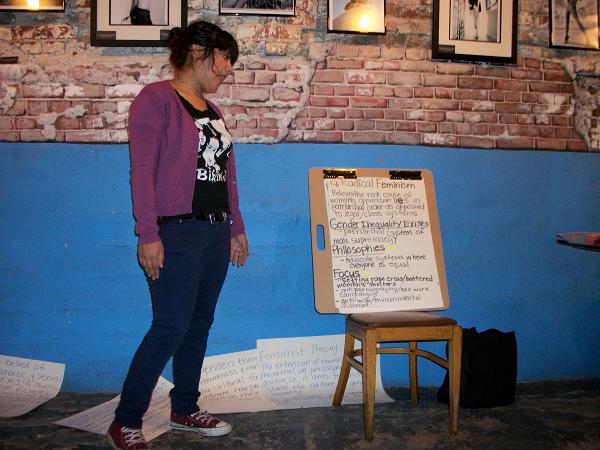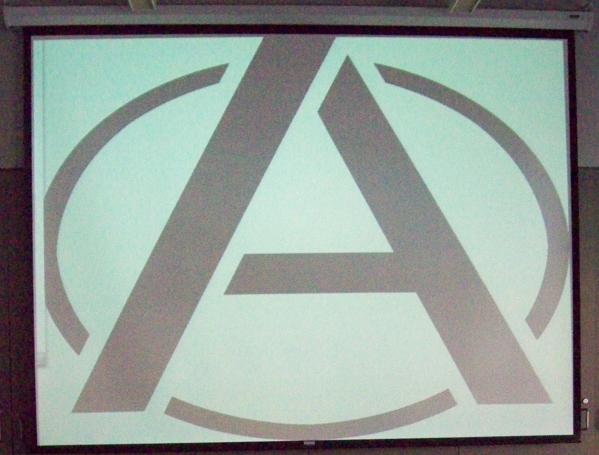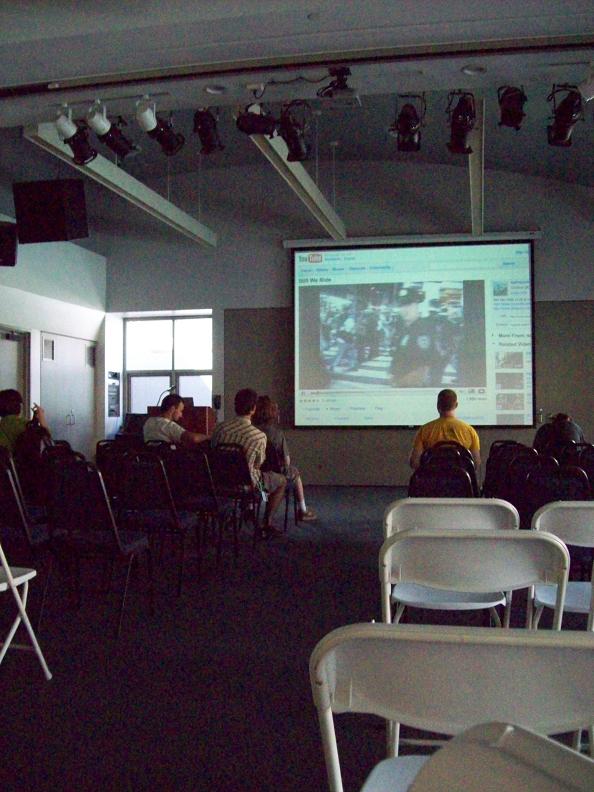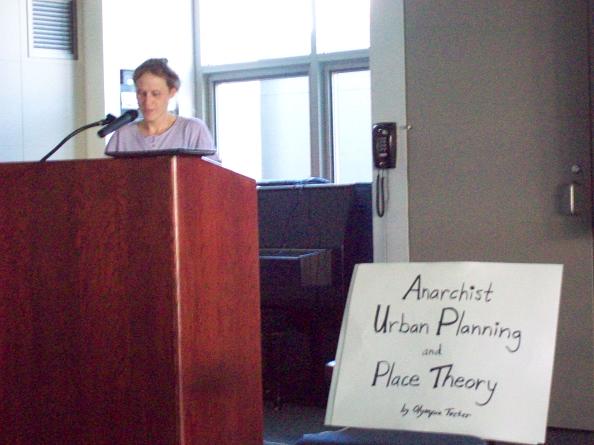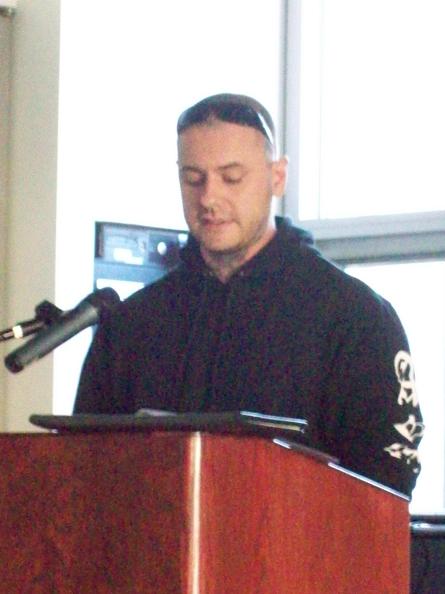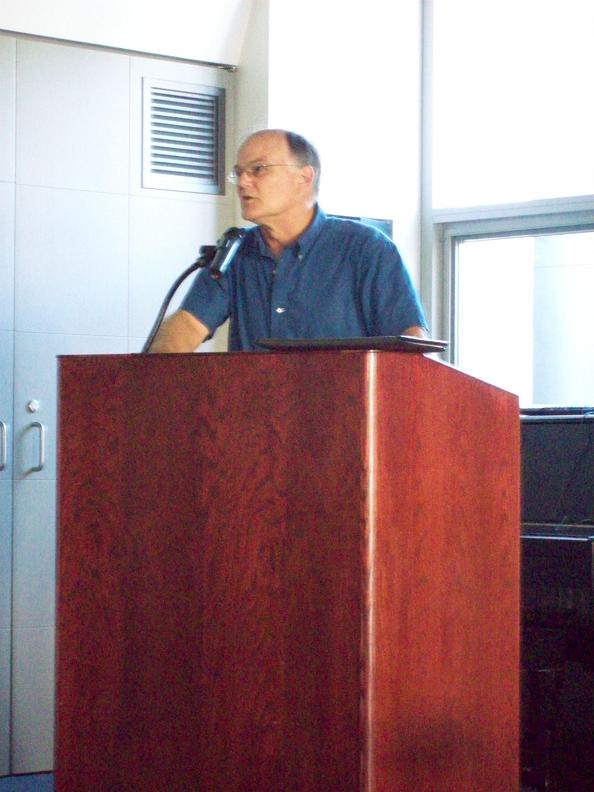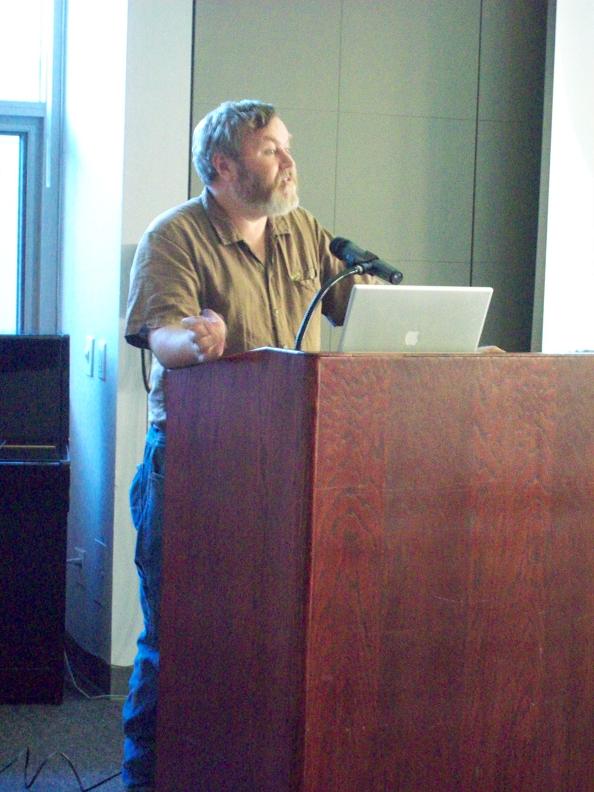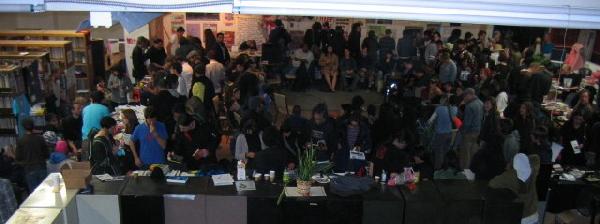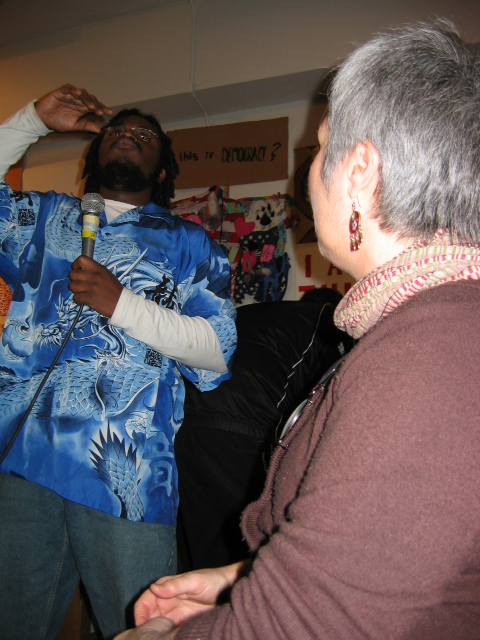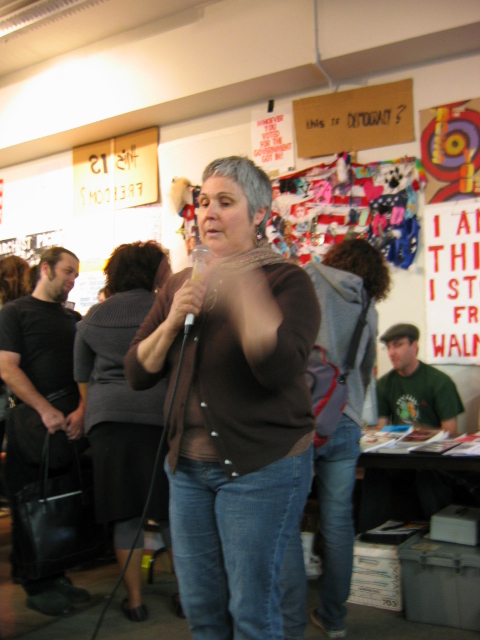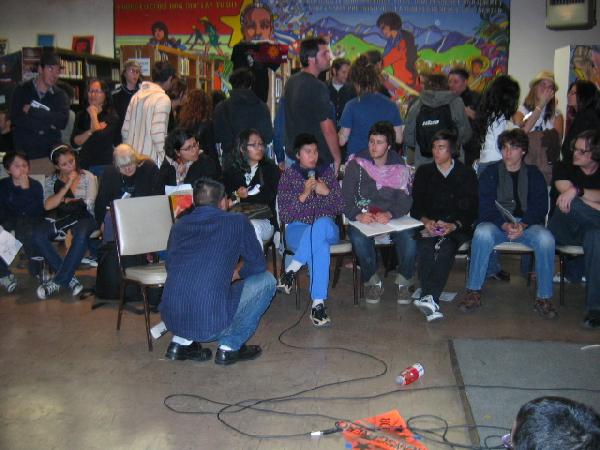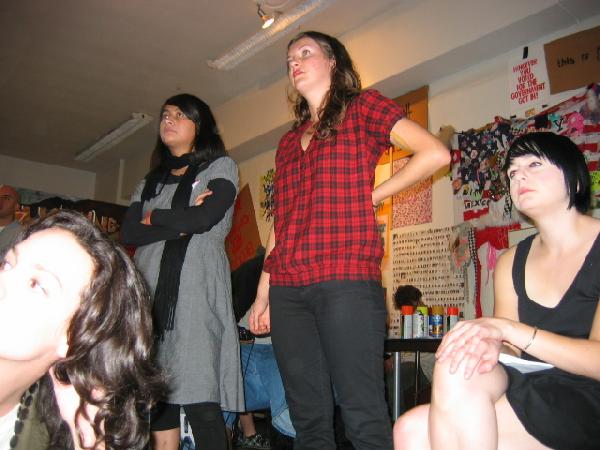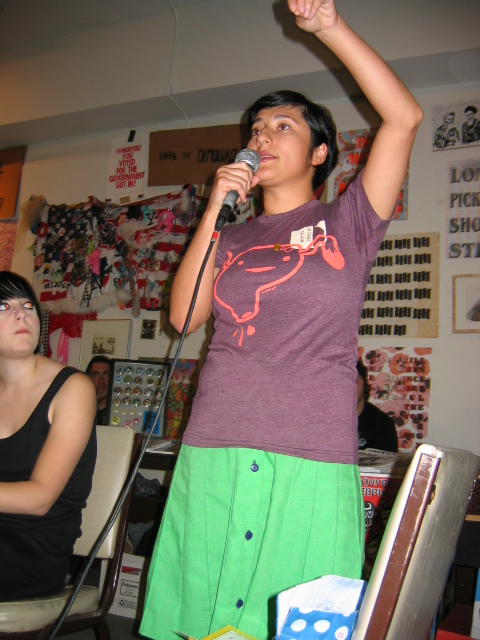Anarchy in Riverside
by Rockero Friday, Feb. 12, 2010 at 4:15 AM
rockero420@yahoo.com
February 6, 2010
RIVERSIDE, California - Riverside-area anarchists hosted a day-long event that included a series of presentations, a group discussion, and musical performances.
The day began with a series of talks, the first of which was given by Gloria from the Inland Empire Feminist Collective. She began with definitions of feminism, patriarchy, and gender, providing an example of patriarchy. "Feminism is the belief in the social, political, economic equality of the sexes. It is the revolutionary movement that includes those who wish the world to be equal." Or, for the less academincally-inclined, she provided the definition, "Feminists are just women who don't want to be treated like shit." She then went through the various theories of feminism: liberal feminism, Marxist feminism, socialist feminism, radical feminism, multicultural/multiracial feminism (including Black feminism and Chicana feminism, to name a few), and finally, anarcha-feminism, detailing the principal tenets and focuses of each. She then handed out a worksheet for participants to fill out, with questions such as "What is Feminism to YOU?" and "How can YOU apply feminism in your life?" While we were busy pondering the questions, a young man descended the staircase, and, oblivious to what was going on, began asking questions about some literature that was on display. We explained to him that there was a workshop going on, and that he was welcome to stay and participate as long as he showed respect for the process already in progress. When he found out that the topic of discussion was feminism, he became vociferous in his opposition to the principle. He spoke loudly and interrupted others, leading some of us to suspect that he was drunk. We asked him to leave. Once attendees had finished filling out the questionnaires, a discussion was held on each of the questions posed by the worksheet. Some of the ideas brought up included the idea that the socially-constructed gender binary was just as oppressive as men as it is of women, and that people should be free to decide on their own who to perform their own gender identity. Reproductive freedom and access to womens' health services were also brought up, while some male feminists asked for advice as to how they could avoid reinforcing patriarchy when interacting with younger relatives. One man argued that the sexes are much more similar than they are different, and asked what we thought of the idea of essentialism. Following the discussion, Gloria invited us to take some flyers for upcoming events and zines on feminism.
In between talks, I spoke with one member of Riverside Food Not Bombs! who told me about recent repressive actions against anarchists by members of the Riverside Police Department. They had shut down one of the community's preferred venues, the Pharoah's Den, and made it very difficult to reopen. They had also ticketed him for being a minor in possession of alcohol despite his not being in possession of any contraband whatsoever, and harassed other members of the collective as they attempted to do their weekly serving.
The next talk was led by Doug from Modesto Anarcho Crew, who began with an overview of the location, economy, and demographics of the Central Valley city. He continued with a description of the crew's organization and tactics. In addition to operating freeboxes, maintaining an autonomous space, and creating propaganda, they participate "in ongoing class and community struggles." "Where the fire is, we bring the gasoline," he summarized. The talk centered on what the speaker characterized as the "tension between activism and intervention." He defined "activism" as "petitioning the government or the powers that be so they can change certain things." "Intervention," "in social struggles and social tensions," on the other hand, is "trying to make those things into wider ruptures against capitalism." This tension, according to the speaker, is exemplified by the dichotomy between the "scene" that seems to exist among anarchists and the "movement" that is necessary to create a "free, non-hierarchical, autonomous society." He discussed some examples of his crew's use of "interventionist" tactics in his area, including support for a rent strike against an absentee landlord, a non-government-sanctioned needle exchange program, for which some are currently facing prosecution, and the interjection of radical strategies and ideas into the student movement. The final part of the talk centered on suggestions as to how to seek out and create allies. He talked about forming alliances with local indigenous tribes, the impoverished, and the LGBT community.
The final talk was on "anarchist infrastructure," and was given by Dana Ward from the Anarchy Archives. Before beginning, he gave an overview of the archives, and then asked us what we wanted to learn about. "I can cover everything from Godwin to the contemporary period, movements, individuals, things like that. [...] I'm a resource. Suck me as dry as you can. I'll get all the information I got in me out if I can. Just tell me what you need to know." Various requests were made: "Bonnot gang!" "Worker's cooperatives." "The origins of anarchism, especially the Paris Commune," "How to raise an anarchist army, Makhnovisti-style." "I'd like to know about the anarchist version of dual power."
He began with the Paris Commune, since the topic also touched on workers' cooperatives and expropriation. That topic led into a lengthy discussion of cooperatives, both in theory, as discussed by the anarchocommunists Kropotkin and Réclus, and in practice, such as the Spanish co-op Mondragón. A few attendees were on the edge of their seats. Others seemed bored out of their minds. Most were somewhere in between. In a brief deviation from the topic of workers' collectives, he touched on the "subculture vs. movement-building" issue. "It's not really an either/or question. [...] It's really a question of creating your scene so that you're able to sustain yourselves, where you practice mutual aid, where you engage in horizontal organization and so forth, so that when the rest of the society collapses, you already have the alternative funtioning and ready to stand in its place." He then returned to the central topic, emphasizing that when both ownership and labor are collectivized, production increases and becomes more safe and efficient, before opening up for questions.
The first questioner asked if collectivization created advancements in the way industries affect the environment, women's equality, and social justice in the same way that they increased efficiency and output. Ward responded that the Argentine example provided the best answer to this question in that when factories were occupied, "the community was brought in." The next question concerned accumulation of power in the absence of government regulation. Ward's response focused on the concept of mutual aid. The next question was about horizontality and collectivization in fields outside of economics, and Ward cited the example of the Modern School.
At this point, we faced yet another interruption by a sexist asshole. "Is this some feminist bullshit? This is gay. Gay, gay, gay," he commented aloud, while Ward was attempting to answer the question. Like the previous guy, he was asked to leave. The recurrence of these types of episodes would seem to indicate one way in which we are either failing to engage potential revolutionaries or failing to prepare for probable contingencies. However, it is probably more likely a comment on the state of our society and issues such as rampant substance abuse, even among our own peers. Further questions were on law enforcement and how to deal with predators among radical communities. (He suggested shunning.)
One of the members of Modesto Anarcho challenged that idea freedom could be had simply by collectivizing the workplace. I took his challenge to mean that liberty is too large to fit only within the economic sphere, and that co-ops do not threaten capitalism per se, but it seemed that Ward interpreted the question in terms of a post-Left critique of work itself. He suggested that such critiques of "work" were rooted in the class backgrounds of the critics. "I come from a working-class background [...] To me, there's no alternative to work!" While it was framed in such a way that it was not worded as a direct attack, I could see how it could have been interpreted as such. A member of the circle broke up the debate before it threatened to consume the basement by suggesting that the topic be discussed later in smaller groups to allow everyone to participate in the conversation at hand. This intervention was fortunate, because it broke up the lecturer-questioner dichotomy to which professors, due to their professional backgrounds, are overly accustomed, whereas the comrade from Modesto was interjecting an idea in a manner meant to challenge everyone, not just the lecturer.
Following that discussion, many small conversations were had among the participants before we reconvened to discuss where to go from there. One man suggested community organizing as a tactic for movement-building. Others proposed ways to apply Modesto's "interventionist" tactic to local issues.
While I was not present for the rest of the event, the LA Anarchist Weekly reported that the Riverside Police Department refused to allow the concert to proceed as scheduled due to a 'blasphemous' representation of Christ on the event's flyer. The flyer depicted Jesus playing an accordion.
Certificate
by Rockero Friday, Feb. 12, 2010 at 4:15 AM
rockero420@yahoo.com
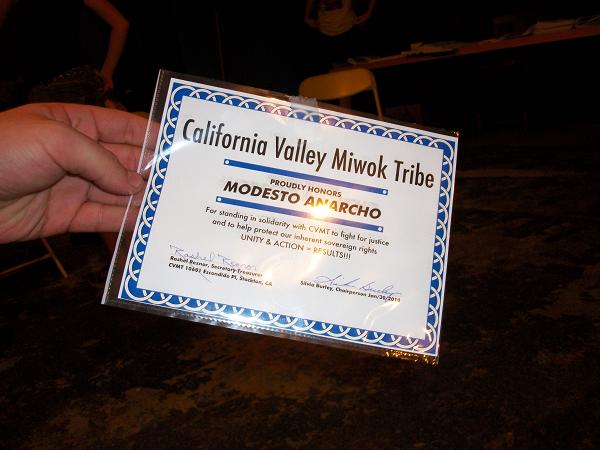
by Rockero Friday, Feb. 12, 2010 at 4:15 AM
rockero420@yahoo.com
audio: MP3 at 1.8 mebibytes
IE Feminist Collective (part 2) by Rockero Friday, Feb. 12, 2010 at 4:15 AM
rockero420@yahoo.com
audio: MP3 at
Modesto Anarcho Crew by Rockero Friday, Feb. 12, 2010 at 4:15 AM
rockero420@yahoo.com
audio: MP3 at 15.0 kibibytes
Dana Ward (part 1) by Rockero Friday, Feb. 12, 2010 at 4:15 AM
rockero420@yahoo.com
audio: MP3 at
Dana Ward (part 2)
by Rockero Friday, Feb. 12, 2010 at 4:15 AM
rockero420@yahoo.com
audio: MP3 at
Blasphemy Rumor by Justin Friday, Feb. 12, 2010 at 6:01 PM
IE Feminist Collective (part 1)
by Rockero Saturday, Feb. 13, 2010 at 2:13 PM
rockero420@yahoo.com
audio: MP3 at 2.0 mebibytes
